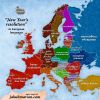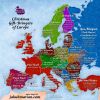-
 +20 +1
+20 +1How countries around the world translated Trump
Countries around the globe struggled to come up with a good translation of Trump's vulgarity.
-
 +12 +2
+12 +2“New Year’s resolution” in European languages
A New Year's resolution is a vow people make to themselves to change an undesired habit or behaviour. The following map shows what New Year's resolutions are called in European languages (different
-
 +23 +4
+23 +4‘Happy New Year’ in European languages
Learn how to wish a "Happy New Year" in German, French, Spanish, Italian and other languages with my neatly coloured map!
-
 +8 +1
+8 +1Christmas gift-bringers of Europe
Find out who brings Christmas gifts in France, Germany, Spain, and many other countries by looking at this neatly coloured map.
-
 +14 +4
+14 +4‘Kill two birds with one stone’ in European languages
Did you know that the animal proverbially killed in the expression "kill two birds with one stone" differs from country to country? The map below shows the type of animal killed (birds are red,
-
 +9 +1
+9 +1What Shakespeare's English Sounded Like - and how we know
-
 +36 +7
+36 +7Lost Languages Discovered in One of the World's Oldest Continuously Run Libraries
The centuries-old texts were erased, and then written over, by monks at Saint Catherine’s Monastery in Egypt
-
 +18 +3
+18 +3Is There a Place in America Where People Speak Without Accents?
Newscasters and Stephen Colbert seem to think so.
-
 +34 +6
+34 +6Sideways Dictionary
Sideways dictionary — it's like a dictionary, but using analogies instead of definitions. Use it as a tool for finding and sharing helpful analogies to explain technological ideas. Because if everyone understands technology better, we can make technology work better for everyone.
-
 +32 +5
+32 +5Whether You Say Freakin', Friggin', Or Frickin' Depends On Where You’re From
F-word substitutes vary by region.
-
 +23 +5
+23 +5Bar Association Considers Striking ‘Honeys’ From the Courtroom
When Lori Rifkin asked the opposing lawyer to stop interrupting her while she questioned a potential witness, he replied: “Don’t raise your voice at me. It’s not becoming of a woman.”
-
 +23 +3
+23 +3Translation fails
Signs are meant to warn you about potential hazards or identify certain things but the task of translation may instead leave you crying from laughter or scratching your head in confusion.
-
 +30 +4
+30 +4Is Bilingualism Really an Advantage?
1922, in “Tractatus Logico-Philosophicus,” the philosopher Ludwig Wittgenstein wrote, “The limits of my language mean the limits of my world.” The words that we have at our disposal affect what we see—and the more words there are, the better our perception. When we learn to speak a different language, we learn to see a bigger world.
-
 +10 +4
+10 +4America's Speech Patterns Uncovered
The Marchex Institute examines the speech patterns of Americans and ranks all 50 states on gabbiness, impatience and fast-talking.
-
 +24 +6
+24 +6You’re already learning languages like a baby (Don't be fooled)
No language-learning program knows what it’s talking about when they say they can show you how to learn a language like a baby. There’s no other way.
-
 +4 +1
+4 +1List of multilingual presidents of the United States
Of the 44 presidents of the United States, at least half have displayed proficiency in speaking or writing a language other than English. Of these, only one, Martin Van Buren, learned English as his second language; his first language was Dutch. Four of the earliest presidents were multilingual, with John Adams and Thomas Jefferson demonstrating proficiency in a number of foreign languages.
-
 +17 +6
+17 +6paralleltext.io
Learn languages by reading books on paralleltext.io. See translation for sentences and listen in parallel in many different languages.
-
 +23 +6
+23 +6Watch girl's face light up as Santa uses sign language in M'bro
Father Christmas and the girl were at the Cleveland Centre in a scene almost straight from Christmas movie Miracle on 34th Street
-
 +25 +5
+25 +5Video claims that if you can read a certain font, you are probably not Japanese
-
 +34 +10
+34 +10Do languages influence our way of thinking?
Each language forces you to think in a slightly different way. There are many concepts that can be expressed easily in one language but not in another. The first thing people think of when asked about differences in vocabulary used in different languages is just isolated words, such as English having no equivalent to the German word Schadenfreude, which means “pleasure derived from the misfortunes of others”.
Submit a link
Start a discussion




















